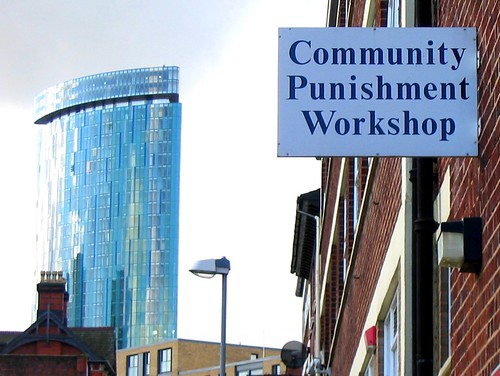Often it seems to me that many of our laws — and quite a bit of the heated rhetoric I read and hear — derive from a tendency to try to correct or prevent bad things by punishing everyone, including those who aren’t responsible for the bad things. I’m against this.

(“Community Punishment Workshop,” by amortize, on Flickr under Creative Commons.)
I first thought about this when I was writing my “If I Were My Own Representative” series, one of which was Part IV: My Touchstone for Voting:
My initial position would be to vote “no” on any bill that had a provision that would hurt some of our citizens, even if it helped some others. I would have to be convinced that the help was worth the hurt; i.e., that the hurt was along the lines as the necessary pain of surgery to correct a life-threatening condition.
If it wasn’t clear what effects some given legislation would have, whether it would hurt some people while helping some others, I would at least ASK. If no one could tell me, again my initial thought would be to vote against it.
I’m coming to believe this in more general terms than just politics: i.e., that in general we shouldn’t blame or punish good people when other people do bad things or allow them to happen. Let me lay out a few assumptions upon which I base this position:
- There are some bad people in the world, who tend to do bad things. However,
- Most people in the world are good or, if not actually good, at least not habitually bad.* Even so, some good people may occasionally do bad things (but, I think, usually by mistake or in extremis).
- Bad things cannot be predicted with certainty, and sometimes not even with confidence.
- When a person does a bad thing, and is considered likely to do more bad things, it is best to place that person in a position where it is more difficult for them to be able to do bad things.
- When a person (good or bad) does a bad thing, and bad people may be inspired to follow their example, it is best to downplay the bad things rather than advertise or sensationalize them.
- When a person (good or bad) does a bad thing, it is a mistake to assume that good people will follow the person’s example.
- Because good people are the majority, and most good people are unlikely to follow the examples of people doing bad things, it is always a mistake to summarily limit the rights of good people (or strip rights from them) in response to bad things.
- This approach will occasionally fail, because it is impossible to prevent all bad things or to identify all potentially bad people.
I don’t expect anyone particularly to agree with me on this (or anything else, for that matter), but that’s the way I’m approaching things right now.
___
*I offer this optional way of characterizing it for those for whom the doctrine of Original Sin, or Jesus’s “no one is good but God” statement (Matthew 19:17, Mark 10:18, Luke 18:19),prevents them from admitting that there may be good people in the world.









Don’t I wish that was how the world works…yet it doesn’t even work that way in a HIGH SCHOOL. Some kids screw up — so everyone loses the privilege. There ARE principals who can change things. Most do not. I have one who does…
And you’d think there would be cheering in the streets because of what she’s doing. But there isn’t. In fact, I find myself wanting to fight it — KNOWING FULL WELL THAT WHAT SHE’S DOING IS RIGHT. The kids are squirming. And the ones who expect to everyone to be punished are squirming, too. They don’t know WHAT to think.
It’s not what I am expecting to react to…weird, right. Right. (my question mark key doesn’t work…)
Not weird at all, Guy – the impulse to “do something” runs very deep, and with it the desire to see something done.
Kudos to that principal for standing against the impulse. It ain’t easy. I’m reminded of what Machiavelli wrote in The Prince: “There is nothing more difficult to take in hand, more perilous to conduct, or more uncertain in its success, than to take the lead in the introduction of a new order of things.”
Thanks!
G